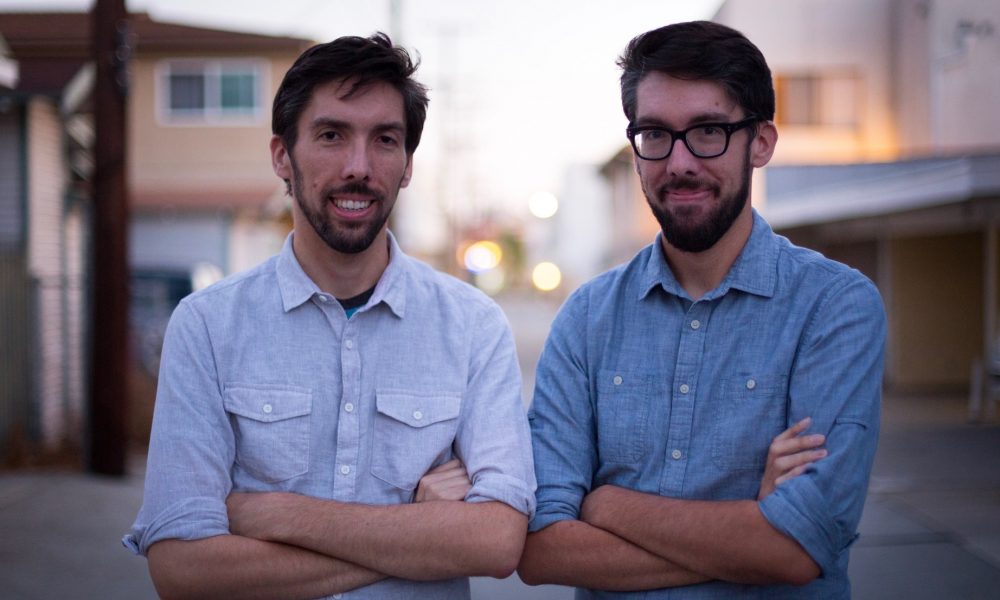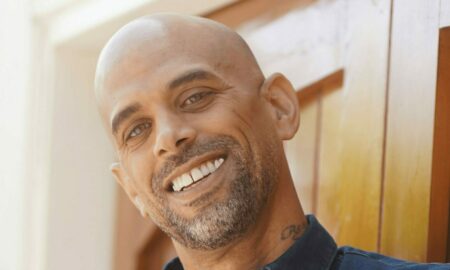

Today we’d like to introduce you to Nick and Max Folkman.
So, before we jump into specific questions about the business, why don’t you give us some details about you and your story.
It all began in a small town in Southeastern, Wisconsin… Actually, there’s no defining moment that either of us could really point to for when we decided we wanted to be writers. We just liked making up stories and working together, wanted to keep doing it, and movies were an easy latching-on point for us. This was all during the time that the internet became *the internet* and when DVD special features and commentaries were big (shout out to Jay Roach’s commentary for Austin Powers for being our first). Both of those turned out to be way more important to our education of storytelling, craft, day-to-day work, and what it realistically means to be a writer, than most of the stuff we learned in college. I (Max) can still remember taking a film production course at UMN where the professor started the first day of class by proclaiming Jaws had no tension.
That said, college was still worthwhile, especially when we got the opportunity to study abroad in Wellington, New Zealand. We’d finished almost all of our required general courses in the States so we could take as many film and writing courses as we could over there. Since we were now living in a city with the actual film industry, we were itching to meet anyone we could. We didn’t care if you were a DIT supervisor at a post facility; if you worked in film, we wanted to talk with you and damned if we didn’t talk to anyone who’d listen. We did that for about a year and a half, and by the end of our stay we were actually set to work on Guillermo Del Toro’s The Hobbit, but once MGM went bankrupt everything became a mess, and by the time it was all sorted out our visas had expired.
After that, we flew back home, graduated, and realized we had to move to Hollywood if we really wanted to get work as screenwriters. The first couple of years for us was mostly split between PA’ing on sets (the first job we landed was actually through someone we had met in NZ) and writing scripts in our spare time. We barely knew anyone before we moved to LA so we didn’t have many friends, which meant we could easily go a week without going outside, except for work and groceries. Important sidenote: Don’t do this, people! If you’re not going out and experiencing life, you’re just going to regurgitate the stuff you already like in your stories, and there’s *plenty* enough of that happening already.
Anyway, after we’d written a bunch of scripts, we decided that we’d submit some of them to The Black List’s website. This site, an offshoot of the annual Black List which listed the most liked unproduced screenplays of the year, would read and review your script on a one-ten scale. If it garnered at least two reviews that were an eight or higher, you’d be added to a weekly newsletter sent out to execs and featured on the site. You had to pay for hosting along with each review (unless some exec stumbled on your script’s page), so this wasn’t something we could afford to do until we were sure we had something, but two of our scripts ending up getting multiple high scores. Sure enough, we got featured, and some studios reached out, but nothing ended up happening, and we pulled the scripts down. Our master plan then became to take the notes we’d gotten, rewrite all of our scripts, put them back up, and wait for the phone to ring.
Well, after we put our scripts up, they *all* came back with lower scores, and it was such a blow to us that we thought, “That’s it. Time to get real jobs.” By then we were running out of money, but we figured we’d take a small vacation before went to work at our local sandwich shop. We decided on San Francisco because it was close and because we could stay with our friend, Brad Muir, who was a project lead at Double Fine Productions. We’d met Brad a year earlier at Indiecade, an independent video game festival in Los Angeles, specifically seeking him out because 1) he was from the midwest too, and 2) Double Fine made some of the most well-written video games in the industry. We didn’t have any hopes or expectations of working in games, at least not back then; we were just happy to talk with the people who were making the games we enjoyed playing.
Fast-forward to San Francisco: we stayed with Brad, told him about our plans to leave screenwriting behind, and the night before we were going to head back to LA, he mentioned that his team was looking for writers and that we should take a writing test for them (his game was Massive Chalice). This was ridiculous to us because, again, we’d never thought about writing for video games, and Double Fine had such a high standard for writing that there was no way they’d hire two guys who had *never been paid to write before*. Still, we agreed to take the test because why not? We filled the test out, got the job, and overnight the career trajectory we’d planned for ourselves shifted. We were still working on scripts in our freetime, but our day job became writing for video games.
This wasn’t to say everything suddenly became easy and finding new gigs was stress-free, because it definitely wasn’t. If anything, working for Double Fine made us super self-conscious and doubtful over whether we deserved even to have that job. We’d thought that when we became “writers,” it’d be obvious to us, but the work we did that got us Massive Chalice didn’t feel any different than the work that succeeded and then bombed on the Black List. It literally felt like somebody flipped a switch and now people were willing to pay us to write for them. These feelings of doubt aren’t remotely unique, as any of you out there who’re creatives or have read interviews with creative people will know, so if there’s any lesson to be gleaned from our story, it’s BELIEVE IN YOURSELF, IDIOT!
Great, so let’s dig a little deeper into the story – has it been an easy path overall and if not, what were the challenges you’ve had to overcome?
Writing is always hard, and making a living as a writer is even harder. When you’re freelancing, half of the stress comes from the job you’re currently working on, and the other half from worrying about *finding* your next job. Once you land one, you then have to think about stuff like what your rate is, what you can conceivably pump out in a day/week, and whether the contract is fair, but even if you figure all of that out and make it through the gig unscathed, you get to close it out by wondering whether you’re going to be paid on time (we’ve had multiple jobs go for months without paying us). You may be reading this and thinking, *no shit*, but this is all stuff we had to learn and as a writing team. We’ve definitely gotten better at wearing our business hats, but we’ve only been able to do that by enduring a lot of okay to *bad* working relationships.
We’d love to hear more about what you do.
We don’t have an “official” business or an LLC or anything, but we are always trying to sell our services as writing partners and collaborators. As freelancers, one of the best parts about writing for games is also one of the most stressful: there’s no one description for it. Sometimes we’re hired at the beginning of a project, and we work with the development team to help create the narrative, what the world should be, who the characters are, etc. Sometimes we’re called in a few months before release to rewrite dialogue because part of the game got cut out at the last second and now the entire narrative doesn’t make sense, and sometimes it’s somewhere in between. Really, the only things you can count on are that the games you write on will always be different, and the nature of your work will always be different.
If we were to be more specific about what we can offer, we do worldbuilding, narrative design, dialogue writing, character creation, and editing. Since we’ve also got a background in film production, we also edit audio/video, record audio, direct VO sessions, and produce. Even if we’re not hired to do them, the latter skills are super helpful because knowing something like how to direct VO actors saves you a lot of time as a writer (you know what dialogue you should keep and what you should take out because the actor can get it across without saying anything). Lately, what we’re known for and are specializing in have been the same thing: writing stories with branching narratives (similar to Choose Your Own Adventure books, but much more complex in how the story/world is affected by the player’s choices), but that’s just because the last couple of games we’ve worked on have all had it in some form.
We’ll take it, though, because they’ve been some of the most interesting projects we’ve worked on yet (and we wish we could actually talk about them, but we’re still under a few NDAs at the moment).
As for what we’re most proud of, we don’t exactly consider this part of our work, but we’re super proud of our podcast Script Lock (https://scriptlock.simplecast.fm/) because of how it has given us a way to pay back all of the goodwill that has been shown toward us in our careers. The idea for it came about because we were fans of a bunch of different screenwriting podcasts for years, but as we worked more in games, we realized that there weren’t any similar ones for game writing or even game storytelling, and that didn’t make sense. Why wasn’t someone getting game devs together to talk about narrative, their creative processes, how they broke in, and their thoughts on the industry? We never really thought that we could do something about it since we had no interviewing/hosting experience and we absolutely hated the idea of forcing someone to listen to our voices, but eventually we got so fed up with waiting for something to fill that void that we went, “Screw it, we’ll do it ourselves.”
We settled on a format of having two guests on at a time because it helped keep the discussions lively, and we wanted to keep each episode’s length around an hour and a half because we wanted to have enough time for guests to become comfortable, and for conversations to actually go somewhere. When we were in college trying to learn as much about screenwriting as we could, one of the most frustrating things was reading/watching an interview with a writer we admired, and seeing the interview be cut short right when things were getting interesting. All we wanted for our podcast was for someone to never have that reaction while listening to it, and thankfully, that hasn’t been the case (so far). We’ve put out 43 episodes over three years, we have a guest list for future episodes that grows larger every month, and the podcast has enough of an audience that now we’re getting invited to game development conferences as press because of it. All because we just made something we wanted to hear.
Is there a characteristic or quality that you feel is essential to success?
Well, we could say something like our honesty or ability to create strong characters, but really the fact that we’re both straight, white dudes that come from an upper-middle-class family is the thing that can’t be ignored. In our experience, success in the various entertainment industries is often a case of luck and being able to last longer than others.
We were very privileged to have a family who, when a job fell through, or a check didn’t arrive fast enough, could provide a safety net for us (emotionally and financially), and that let us keep trying in Hollywood when a lot of other people couldn’t. If we had to say something else, though, “Don’t be an asshole,” is probably the most important code we try to live by.
Contact Info:




Image Credit:
Lily Nishita
Getting in touch: VoyageLA is built on recommendations from the community; it’s how we uncover hidden gems, so if you know someone who deserves recognition please let us know here.



















